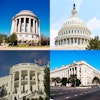Antitrust
The Chamber advocates for antitrust laws that benefit all consumers and businesses and do not target specific companies or industries.

Latest
Our Work
Antitrust laws ensure competition in free and open markets, which is the foundation of any vibrant, diverse, and dynamic economy. Healthy market competition benefits consumers through lower prices, higher quality products and services, more choices, and greater innovation.
Events
- TechnologyTechnology Leadership Summit 2026Wednesday, March 1108:30 AM EDT - 02:00 PM EDTU.S. Chamber of Commerce, 1615 H St NW, Washington, DC 20062Learn More
- InfrastructureKeep America Moving SummitTuesday, March 1708:00 AM EDT - 05:30 PM EDTU.S. Chamber of Commerce, 1615 H St NW, Washington, DC 20062Learn More
Latest Content
- With 2026 finally here, we asked our panel of experts about the resolutions they hope to see from the Department of Justice and the Federal Trade Commission.This Hill letter was sent to the Members of the House Judiciary Committee ahead of the upcoming hearing titled, “Anti-American Antitrust: How Foreign Governments Target U.S. Businesses.”Antitrust fines based on global turnover result in disproportionate penalties, as seen in Apple's challenge to fines in India.Answering antitrust’s challenges one question at a time.The App Store Freedom Act (ASFA), misrepresented as children's privacy legislation, is a failed antitrust bill that contradicts President Trump's stance against EU-style tech regulation and risks enabling FTC overreach by conflating consumer protection with competition authority.The Chamber responds to a request for information from the Federal Trade Commission on employer noncompete agreements.We asked our Prompt panel to agree or disagree with a variety of statements pertaining to state merger issues.The Trump administration's FTC is reversing the Biden-era Section 5 policy statement and addressing its overreach, including a flawed lawsuit against pharmacy benefit managers, to restore evidence-based enforcement and free-market principles.















